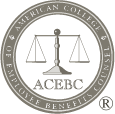Jeffrey D. Mamorsky
Jeffrey D. Mamorsky, who died in 2025 at age 79, was one of the nation’s preeminent employee benefits attorneys, a trailblazer influential in development of the Employee Retirement Income Security Act of 1974 (“ERISA”). He was inducted as a Charter Fellow of the American College of Employee Benefits Counsel (the “College”) in 2000.
A talented writer and researcher, Jeff received his B.A. from New York University in 1967. He originally aspired to be a sportswriter and worked his way through school taking assignments for newspapers. His mom’s advice helped influence him to switch to law. A law school scholarship set him on his way in the law school at the University of Buffalo. After one year there, he was drafted by the Army to serve in the Reserves during the Vietnam War.
After completing his military service and pending his return to law school, he took a position with Prentice Hall in Englewood, NJ as a legal editor which launched his career in the pension and profit-sharing area. The job gave him a bird’s eye view to the developing law as he covered pension reform legislative proposals and Congressional hearings and enjoyed personal access to policymakers. Leo Brown, pension chief of the IRS in Manhattan, became a friend of Jeff and taught him about pensions. IRS pension chief and later College Fellow Isidore Goodman “asked [Jeff] to cover and publish all his speeches for the Prentice Hall Pension & Profit-Sharing publications.”
While working at Prentice Hall, Jeff resumed his legal studies. He received his J.D. from New York Law School in 1972.
In 1972, Jeff left Prentice Hall to join Mobil Oil as benefits and compensation counsel. His mentor, Leo Brown, influenced him to accept this position over law firm opportunities at a time when benefits practitioners were yet to hold key roles in law firm practice. While at Mobil Oil, Jeff impressed the upper management and was chosen to be counsel to a Business Roundtable Taskforce established to review the pension reform bills being introduced in Congress. The Taskforce was the precursor to the ERISA Industry Committee, later known as ERIC.
In his Taskforce role, Jeff began working with the House Pension Task Force and the Senate Finance Committee in looking at the bills, which led to his involvement in development of ERISA representing corporate interests. Jeff worked with Congressional staff members for key legislators involved in ERISA, including Senator Javits, Senator Williams, Congressman Dent, and Congressman Erlenborn. He provided specialized input to them, helped greatly by his unusual combination of benefits experience at Prentice Hall and Mobil Oil as in-house counsel. Jeff remarked that “it was educating the four gentlemen who were responsible for the ERISA statute and their staff people that was really our most important work.” At the end of the process, on September 2, 1974, Jeff was among the guests invited to attend the White House signing by President Gerald Ford.
Jeff earned his LL.M., Taxation, from the New York University School of Law in 1975. After leaving Mobil Oil, Jeff worked in New York in private practice at a number of law firms over his career: Vedder Price from 1977 to 1982; Shea and Gould from 1982 to 1984; Wender Murase from 1984 to 1985; Rubin Baum from 1986 to 1987; and Curtis, Mallet, Prevost, Colt & Mosle from 1987 to 2000.
In February 2000, Jeff joined Greenberg Traurig LLP. There he was Co-Chair Global Benefits & Compensation Practice, and Co-Chair of the Labor & Employment Practice’s ERISA & Employee Benefits Litigation group. In May 2023, he became a partner at Cohen & Buckmann P.C. In 2024, he shared his experience and knowledge at a Worldwide Employee Benefits Network "ERISA at 50" panel, providing unique insights on the history of employee benefits regulation.
Jeff became a nationally recognized practitioner representing multinational corporations, financial institutions, insurance companies, and other major organizations on their most sophisticated employee benefits matters, helping them navigate regulatory challenges and safeguard the integrity of their plans. He was creative and solution-oriented, driven to meet his clients’ needs within the law. Throughout his career Jeff developed deep expertise in various aspects of ERISA extending beyond tax and embracing labor and employment. His interest in fiduciary matters and the protection of plan participants was an area of distinction and personal importance. Prior to ERISA fiduciary standards for employee retirement plans were lacking, an extensive framework applicable to plan sponsors was included in the new legislation. Jeff took a great interest in this and ultimately created a process for employers to comply with fiduciary standards called the Fiduciary Audit®, used by many companies to comply with ERISA’s requirements.
As the U.K. and Europe followed the U.S. in moving from the defined benefit to the defined contribution design approach, he also provided guidance to clients internationally and was featured on programs of the International Pension & Employee Benefits Lawyers Association. As friend and College Fellow Israel Goldowitz noted, “With his experience, he could compare the underpinnings of US and non-US pension regulation as few others could.”
Jeff was a frequent lecturer and author on topics surrounding ERISA and employee benefits, including a two-volume treatise, Employee Benefits Law: ERISA and Beyond. Jeff was also a founder and editor-in-chief of the Journal of Compensation and Benefits.
Those who knew him reported that he was down to earth with a passion for classic cars and New York sports. “Jeff was one of a kind — a gracious and thoughtful person who always had a positive aura and a kind word to everyone he met,” recalled College Fellow Sandra Cohen, co-founder and managing partner of Cohen & Buckmann. “Jeff was a patient mentor and an enthusiastic collaborator, well-deserving of his reputation as a titan in the ERISA bar.”
Sources include: 2010 interview by W. Scott Simon published in fiduciary-experts.com, a Morningstar publication.
Photo Source: The Decade Book, American College of Employee Benefits Counsel 2000-2010


